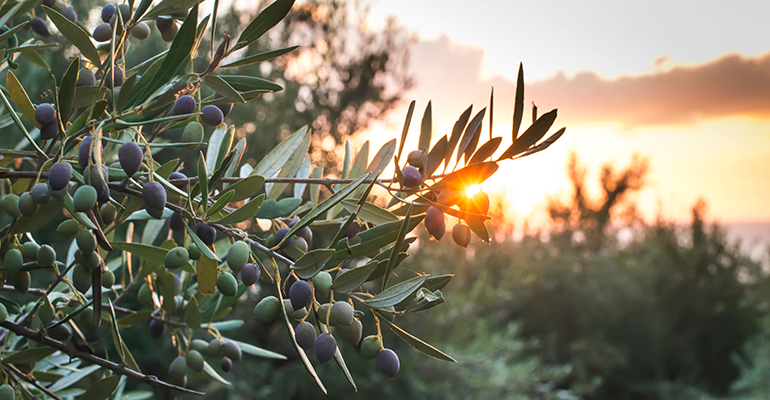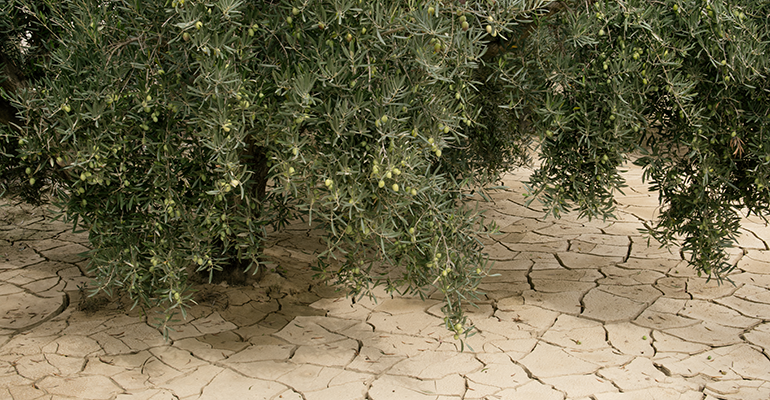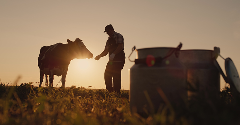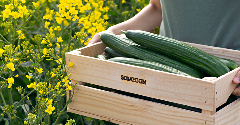News
Drought in southern Europe threatens global olive oil supply
11 Oct 2022
Drought and limited rainfall across much of southern Europe throughout the summer months has lowered the supply and increased the price of olive oil worldwide.
Olive oil supply is under threat as Spain, the world’s largest producer, suffered a period of severe heatwaves and extreme drought over the recent summer months.

Temperatures soared to record highs of up to forty degrees Celsius (104.5 degrees Fahrenheit) across regions of southern France, Spain, Portugal, and Italy throughout July. These high temperatures, along with a severe lack of rainfall over the course of the summer, meant that by August as much as two thirds of the land in the European Union was in a state of drought, data from the European Drought Observatory shows.
Olive oil prices hit record highs
Accounting for over two-fifths of global supply in 2021, Spain is the top producer of olive oil in the world, according to the International Olive Council. Greece comes in at second, followed by Italy and Portugal.
With the harsh environmental conditions of the past few months placing strain on the ability of farmers across southern Europe to keep pace with the unfaltering global demand for olive oil, prices of the commodity are rising. Data from the International Olive Council shows that prices of refined olive oil in Jaén in southern Spain, the Spanish benchmark, rose 22.8% in June from the previous crop year, reaching a value of €395.5 per 100kg. While in Bari in southern Italy, extra virgin olive oil totaled an average cost of €508 per 100kg (+21%), compared to €345 per 100kg (+11.3%) in Chania, Greece.
“In 2021, the gross value added and the export value of goods in Spain was around €1.09 trillion and €323 billion, respectively. The estimated value of exports of olive oil in Spain is around €3.196 billion in the 2020/2021 crop year, including extra-EU (€1.453 billion) and intra-EU (€1.742 billion). Olive oil exports from Spain account for around 1% of global exports,” said the executive secretariat of the International Olive Council.
Despite representing a relatively small percentage of the country’s total exports, the wider costs of a reduced ability to produce and trade olive oil could be significant, particularly for farmers affected by the drought, as Francesca De Ritis, grower and owner of a private label olive oil brand who selects, imports and distributes premium quality extra virgin olive oil in The Netherlands points out.
“Olive oil is essential to the economy. Spain counts more than 350,000,000 trees and Andalucia produces approximately 80% of the total production. I believe some growers will be more impacted than others. Small and medium sized producers that are not equipped with irrigation system and or access to water are for sure affected the most,” De Ritis said.
Consumers take the hit with inflated vegetable oil prices
Challenges in the supply of sunflower oil fueled by Russia’s invasion of Ukraine, caused the cost of vegetable oils to hit a record high last February and increase by a further 30% in the month following the invasion. As it stands in 2022, vegetable oil prices are on average higher than ever before, having risen by over 200% in two years alone, according to data from The Food Foundation and the Food and Agriculture Organization (FAO).
For consumers, this is expected to translate into higher costs at the supermarket as producers raise prices to offset a proportion of their inflationary costs. As little as a 10% rise would see producer prices of olive oil reach their highest level yet, according to Mintec data, cited by CNN. As the biggest importers of olive oil worldwide, consumers in the US, Brazil and Spain could be hardest hit, accounting for 33.8%, 9.5%, and 9% of total imports respectively.
 © AdobeStock/majivecka
© AdobeStock/majivecka
Low levels of rainfall threaten future supply
This problem is only expected to worsen moving into the new year, as a third consecutive year of minimal rainfall has reduced the store of water in the region’s dams and rivers.
In July, data from the Environment Ministry showed that Spain’s dams were at an 8% reduction in capacity compared to the previous decade average, while water levels in the in the Guadalquivir River, an important irrigation system for the surrounding olive groves, were reported to be critically low.
“Water is essential and is the limiting factor for a higher oil yield. Andalucia is making efforts to support farmers and facilitate access to water, monitoring drought and evaluating solutions,” De Ritis said.
“Spain is working on combatting the effects of climate change from many angles. There are subventions being offered to growers but also ongoing studies on olive cultivars best suited for a hotter climate and drought are being carried out by private and public institutions.”
With a recent report by the European Commission finding that Europe is suffering its worst drought in 500 years, the problem is not unique to Spain. Over the summer months, drought conditions were reported in countries across the continent including Italy and Portugal, two major olive oil exporters, which is only working to further squeeze the global supply.
Due to these issues, this year alone, Spanish olive oil production could decrease by up to 30% year-on-year, falling further in the years to come, a Mintec analyst told CNN.
Attempting to offset olive oil supply challenges
In attempt to offset the challenges to oil production in Spain caused by drought conditions, the Spanish government formed a plan to expand existing and construct new desalination plants, harnessing seawater to ease the water shortage.
One plant at Campo de Dalias, is set to increase production by around 40,000 cubic metres of water per day over the course of the next four years. The water produced is then used to irrigate the surrounding agricultural land.
“The capacity of production is increasing due to fact that new plantations are being established and existing ones restored with more efficient water mechanism. Furthermore, the use of new semi-intensive and extensive plantations with high densities trees per hectare increase the production which balance adverse situations,” the International Olive Council told Ingredients Network.
The hope is that this solution will ease the damage of rising environmental and financial costs moving forward, yet further investment and research is required to provide a lasting solution to ongoing environmental challenges.
“To face future climate challenges the olive growing sector in the Mediterranean needs research and investment in modern farming technology, climate monitoring, efficient energy utilisation, rainwater collection, [and] phytosanitary [inputs],” said De Ritis.
Related news

Soy story: WWF scores UK supermarkets on sustainability efforts
12 Nov 2025
WWF has published its latest “Soy Scorecard”, ranking UK supermarkets’ efforts to combat deforestation and land conversion in their soy supply chains.
Read more
Standing Ovation and Bel scale up casein production from dairy co-products
11 Nov 2025
Foodtech company Standing Ovation has partnered with cheese specialist Bel Group to manufacture dairy serums for industrial-scale casein production via precision fermentation.
Read more
New UPF standard hoped to offer consumers ‘coherence and clarity’
10 Nov 2025
Ingredients companies are being urged to enter “a new era of partnership and innovation” following the launch of the industry’s first non-UPF verification scheme.
Read more
Whistleblowers accuse UK meat industry of promoting cheap, unsustainable supply
7 Nov 2025
An anonymous group of industry insiders has accused the UK’s biggest food companies of systematically driving down meat quality and welfare standards.
Read more
Bord Bia presents Irish dairy ingredient suppliers at Fi Europe
6 Nov 2025
Dairygold Co-operative Society, The Carbery Group, and Ornua Co-operative: Meet with sustainable producers of Irish dairy ingredients at Food ingredients Europe 2025, Hall 7.2 Stand M18.
Read more
AI attraction means foodtech startups must ‘prove’ rather than ‘promise’
4 Nov 2025
Reports suggest that artificial intelligence (AI) is sucking investment from foodtech and agritech, but investors say the picture is complicated.
Read more
Penguin and Club bars no longer classed as chocolate
30 Oct 2025
Penguin and Club bars can no longer be classified as chocolate after the pladis-owned McVitie’s brands turned to cheaper alternatives amid the ongoing cocoa crisis.
Read more
Could plant-based protection replace plastic packaging?
29 Oct 2025
Swedish foodtech company Saveggy has launched an additive-free plant-based protection for cucumbers, offering a waste-free packaging solution for fruit and vegetables.
Read more
Does promoting protein content push up plant-based sales?
27 Oct 2025
Promoting the protein content of meat-free products is a more effective sales strategy than adding carbon labels, a study of UK bakery chain Greggs suggests.
Read more
Amazon Grocery launch aims to balance quality with affordability
22 Oct 2025
Global e-commerce giant Amazon has introduced a new private-label food brand, combining existing Amazon Fresh and Happy Belly products with new everyday items.
Read more